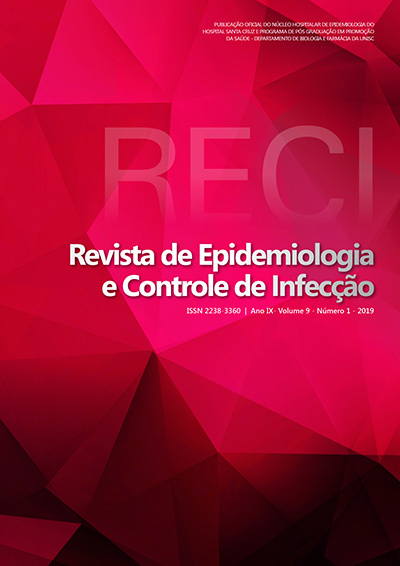Evaluation of surgical antimicrobial prophylaxis in a teaching hospital
DOI:
https://doi.org/10.17058/reci.v9i1.11461Abstract
Background and Objectives: In view of the relevance and scarcity of studies carried out in the northeastern region of Brazil, this study aims to evaluate the antimicrobial prophylaxis in the perioperative period of elective surgeries performed at a teaching hospital in Sergipe. Method: Descriptive study, with collection of information contained in forms of surveillance of adverse events of the institution, from January to December 2015. The data were collected and entered by a nursing student in an Epi-Info 7 software data base between November 2015 and February 2016. The variables analyzed were related to the characterization of patients, the surgical procedures performed and the surgical antimicrobial prophylaxis. Categorical variable were analyzed by frequency distribution and for the quantitative variables, the corresponding central tendency and dispersion measures. The study respected the ethical precepts. Results: We evaluated 752 chips for the surveillance of adverse events and post-operative complications. Antimicrobial prophylaxis was used in 78.80% of the surgeries, followed by the standardization of the infection control service for antibiotic selection (91.80%), was administered at the ideal time (10.90%) and considered adequate (antibiotic choice, timing of administration, and duration of prophylaxis) (4.40%). The highest antibiotic class was cephalosporin (93.60%) and the peal was performed in only 22.20% of the surgeries that had been indicated. Conclusion: The majority of antimicrobial prophylaxis of this study does not meet the guidelines recommended by the national and international guidelines. This finding reinforces the need to carry out interventions that lead to changes in the work process of the surgical teams and guarantee the quality of patient care and safety. Keywords: Surgical Wound Infection. Antibiotic Prophylaxis. Patient Safety.Downloads
Downloads
Published
How to Cite
Issue
Section
License
The author must state that the paper is original (has not been published previously), not infringing any copyright or other ownership right involving third parties. Once the paper is submitted, the Journal reserves the right to make normative changes, such as spelling and grammar, in order to maintain the language standard, but respecting the author’s style. The published papers become ownership of RECI, considering that all the opinions expressed by the authors are their responsibility. Because we are an open access journal, we allow free use of articles in educational and scientific applications provided the source is cited under the Creative Commons CC-BY license.


